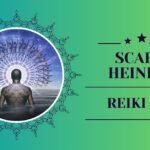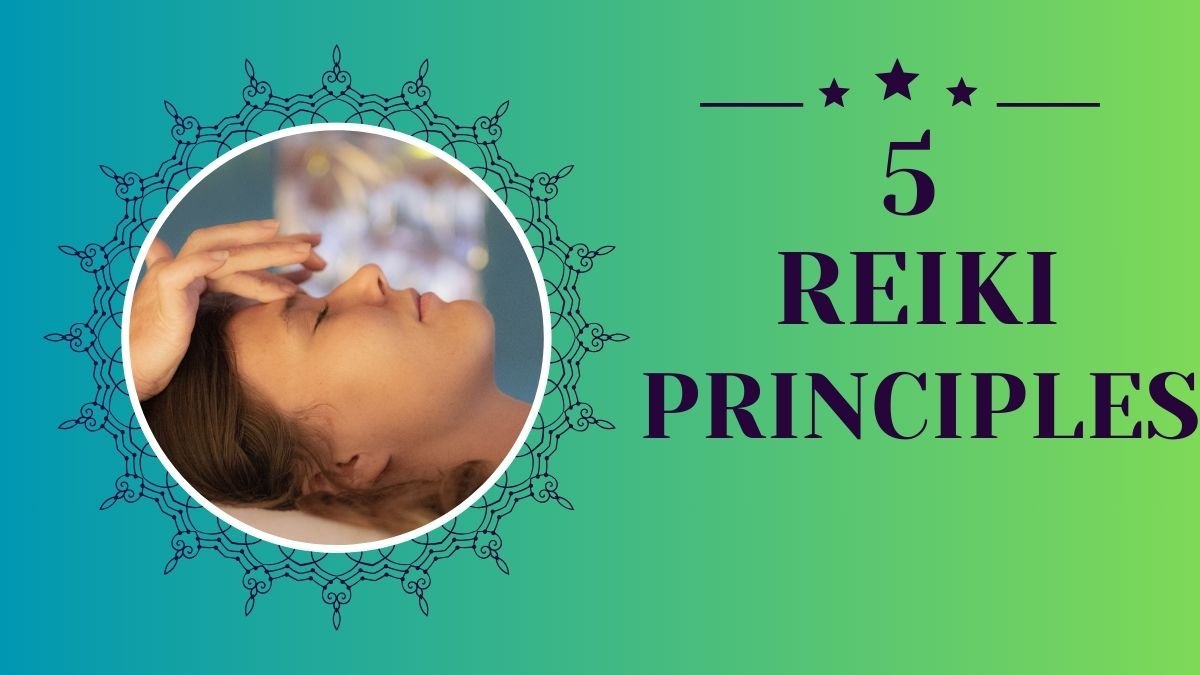Hello Yogis welcome to reiki school india,In this blog we will discuss about 5 Reiki Principles so stay tune,In the realm of holistic wellness, an ancient Eastern practice has been making waves in the Western world, offering a tranquil haven amid the chaos of modern life.
Rooted in the belief that life force energy flows within each of us, Reiki is a profound system of natural healing that encourages balance, relaxation, and the revitalization of our spiritual and emotional well-being.
At the heart of Reiki teachings lie the Five Principles, a roadmap to living a life imbued with positivity, gratitude, and mindfulness. For those unfamiliar, these principles are not mere affirmations but are meant to be consciously lived out each day, acting as guides for interaction with oneself and the world at large.
Join us as we explore the essence of Reiki and the practical application of its founding principles for a life of fulfillment, peace, and shared love with every living being.
The Essence of Reiki and Its Significance for Modern Life

Reiki, a Japanese healing technique, derives its name from the combination of two words—“rei” meaning “universal” and “ki” meaning “life energy”. The essence of Reiki lies in its ability to tap into the universal flow of this life force energy to catalyze healing in the recipient, be it for the physical body, the mind, or the spirit.
In a world that often feels disconnected, Reiki offers a modality that speaks to our deepest need for unity, both with ourselves and with others. Unlike modern medicine, Reiki is not merely a cure for ailments; it is a holistic approach to well-being, centering on the balance of energy that animates our physical form. Its practice ranges from hands-on energy healing to compassionate interaction and the cultivation of an energetically balanced life.
The Origin Story of Reiki

Reiki can be traced back to Dr. Mikao Usui, a Japanese Buddhist who lived in the mid-1800s. Following a profound spiritual experience atop Mount Kurama, Usui created the system of healing that we now know as Reiki.
He attuned himself to the Reiki energy and taught others how to do the same, allowing them to also serve as conduits for the life force energy to heal themselves and others.
What began as a personal healing and enlightenment found in meditation and fasting transformed into a worldwide practice under the guidance of Usui’s teachings. Today, Reiki remains an evolving and inclusive practice, open to all who seek its healing touch.
The Five Reiki Principles:
Just for today,
- I will not be angry
- I will not worry
- I will be grateful
- I will do my work honestly
- I will be kind to every living thing
Exploring the profound simplicity of these principles, we discover a path towards a life of intention and mindfulness. They act as daily affirmations and when absorbed and followed, they prompt a personal healing that radiates through our interactions, serving as a catalyst for collective well-being.
Each of these principles invites deep introspection and transformation:
- Anger: invites us to witness our emotional response and work towards a state of acceptance and tranquility.
- Worry: implores us to relinquish the illusion of control and trust in the universal energy that sustains us.
- Gratitude: encourages us to appreciate each moment as a gift, fostering an attitude of abundance.
- Honesty: calls for us to align our actions and intentions, cultivating a life of integrity and purpose.
- Kindness: serves as a constant reminder of our connectedness, inspiring compassion for all beings.
Integrating the 5 Reiki Principles into Daily Life

The key to reaping the benefits of the 5 Reiki principles is application—understanding how to embed them into our daily routines and experiences.
The Principle of Anger
Anger is a natural human emotion, yet it can be all-consuming, often leading to suffering for ourselves and those around us. “Just for today, I will not be angry” is an invocation to self-heal, a commitment to seeking joy and peace despite life’s challenges.
It is about acknowledging anger without allowing it to define our day or decisions. This principle could manifest as taking a step back in heated moments, breathing through the emotion, and choosing a path that leads to resolution rather than resentment.
The Principle of Worry
Worry is the fear of the unknown, a mental habit that distracts us from the present moment. The Reiki principle to not worry suggests that, ‘just for today,’ we release the need to anticipate negative outcomes.
This might translate into refraining from catastrophic thinking, which often leads to more worry. Instead, focusing on the here and now, and trusting in the unfolding of life’s events can be profoundly liberating.
The Principle of Gratitude
Gratitude is a powerful healer, shifting the focus from lack to abundance, from self-centeredness to sharing. Practicing gratitude ‘just for today’ means finding something for which to be thankful in each experience, no matter how small.
It can be as simple as the warmth of the sun or the smile of a stranger. This shift in perspective allows us to vibrate at a higher energy frequency, attracting more positive experiences.
The Principle of Honesty
Honesty, in the Reiki context, extends beyond telling the truth. It encourages a life lived with sincerity and righteousness, where our actions align with the highest good.
By committing to honesty ‘just for today,’ we engage in self-reflection, ensuring our pursuits and labor contribute positively to the world. This principle challenges us to consider the impact of our work and the integrity behind our everyday decisions.
The Principle of Kindness
Kindness is often framed as a desirable trait, yet in Reiki, it is regarded as a fundamental aspect of our well-being. Extending kindness ‘just for today’ does not require grand gestures; it can be as subtle as a smile or a word of encouragement.
This small act of kindness ripples through the interconnected web of life, creating a more harmonious existence for all.
Real-World Application and Testimonials

The jury is in—practicing the 5 Reiki principles yields tangible benefits for real people. Here are some stories of transformation from those who have made them a part of their daily lives:
“I found that by honoring the principle of kindness, I observed a positive change in my relationships. My interactions became more harmonious, and I felt a sense of joy in the exchanges with others.”
“Gratitude became my anchor during a particularly challenging time. Choosing to reflect on the blessings in my life rather than what was missing gave me the strength and resilience to move forward.”
“The principle of not worrying initiated a shift in perspective for me. I learned to focus on what I can control and my responsibility towards it, rather than allowing anxiety to dictate my actions.”
“Choosing to be honest in my dealings brought an unexpected sense of freedom. It was liberating to live without the weight of falsehoods, both consciously and subconsciously.”
“By committing to not be angry ‘just for today,’ my emotional landscape changed. I felt lighter and more at peace, which translated into a more fulfilling daily experience.”
The Synergy of Reiki and Meditation

Meditation is a brother to the Reiki practice and a perfect companion for integrating the 5 Reiki principles. Together, they offer a comprehensive support system for those on a wellness or spiritual path.
During Your Meditation
Begin your meditation practice by silently or audibly affirming the 5 Reiki principles.
This anchors the principles to your day, ensuring they guide your thoughts and actions. Each meditation becomes a subtle yet powerful exercise in living the principles.
Self-Treatment with Reiki
Those attuned to Reiki can perform self-treatments, a hands-on practice that deepens the connection with the principles.
Incorporating the principles into your self-treatment adds a layer of intention to the healing, fostering profound shifts in your energy field.
A Call to Reiki

The 5 Reiki principles offer not only a path to personal peace but also a roadmap for uniting with the collective consciousness. By living these principles, we open ourselves to universal energies, creating a ripple of harmony that reaches out beyond our immediate sphere of influence.
For those seeking a transformation in their life, a taste of serenity in the midst of chaos, or a connection to something greater, Reiki is a practice worth exploring.
Why not experience the loving touch of Reiki for yourself? Incorporate its principles into your daily life, and watch as the world responds in kind.
Conclusion 5 Reiki Principles
The wisdom embedded in the 5 Reiki principles transcends the practice itself, offering a blueprint for living a life of harmony, peace, and purpose. By adopting these principles into our daily existence, we cultivate a space where wellness and spiritual growth can flourish.
It’s not about performing grand gestures of self-improvement but rather about making small, consistent changes—choosing not to be governed by anger or worry, practicing gratitude and honesty, and extending kindness without expectation of return. These principles guide us towards a deeper understanding of our place in the universe and our connection to all living beings. As we move forward, letting these principles light our path, we not only transform ourselves but also contribute to the collective energy shift towards a more compassionate world. The beauty of Reiki is its simplicity and universality, making it accessible to anyone willing to open their heart to its teachings.
Frequently Asked Questions about 5 Reiki Principles
What are the benefits of practicing the 5 Reiki principles daily?
Practicing the 5 Reiki principles daily leads to increased emotional balance, a sense of inner peace, and reduces stress and anxiety. It encourages positive interactions with others and fosters an attitude of gratitude, which can significantly enhance your mental and emotional well-being.
Can non-Reiki practitioners benefit from the 5 Reiki Principles?
Absolutely. The Reiki principles are universal in nature and can be adopted by anyone looking to lead a more mindful and peaceful life. They serve as guiding philosophies that encourage living with integrity, kindness, and gratitude, regardless of one’s familiarity with Reiki as a practice.
How quickly can I see changes in my life after applying these principles?
The speed at which changes manifest can vary greatly among individuals. For some, the effects are noticeable almost immediately, while for others, it may take some time to observe tangible changes. Consistency and sincerity in applying the principles are key to experiencing their profound benefits.
Do I need to be attuned to Reiki to use these principles for meditation?
No, attunement is not necessary to meditate on or incorporate the Reiki principles into your daily life. While Reiki attunement enhances one’s connection to Reiki energy, the principles themselves can be a powerful tool for anyone looking to deepen their meditation practice or personal growth.
How can I remember to practice these principles every day?
Creating a daily ritual or reminder can be effective. Some people choose to recite the principles each morning, keep a journal to reflect on their application throughout the day, or set reminders on their phone. Integrating the practice into your daily routine is a helpful way to ensure it becomes a lasting habit.







